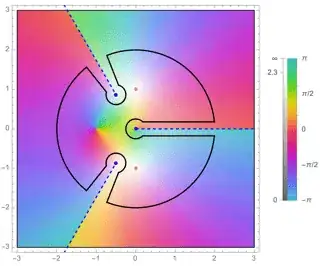Solution using complex analysis
By substituting $x\mapsto\sqrt x$,
$$I = \int_{-\infty}^\infty \frac{\log(x^4+x^2+1)}{x^4+1} \, dx = \int_0^\infty \frac{\log(x^2+x+1)}{\sqrt x(x^2+1)} \, dx$$
Let $f(z)=\dfrac{\log\left(z^2+z+1\right)}{\sqrt z(z^2+1)}$ and integrate over a deformed circular contour $\mathcal C$ such that it avoids the branch points at $z\in\left\{0,e^{i\frac{2\pi}3},e^{i\frac{4\pi}3}\right\}$ and the respective cuts at $[0,\infty)$, $e^{i\frac{2\pi}3}[1,\infty)$, and $e^{i\frac{4\pi}3}[1,\infty)$. Label the "banks" along each $A$/$A'$, $B$/$B'$, and $C$/$C'$, where the unprimed banks are traversed away from the origin and vice versa.

Parameterize the banks by
$$\begin{array}{c|cc|c|c}
A & z = x + i\varepsilon & dz = dx & x\in[\varepsilon,R] & \arg(z)\to0 \\
A' & z = x - i\varepsilon & dz = dx & x\in[R,\varepsilon] & \arg(z)\to2\pi \\
\hline
B & z = e^{i\left(\frac{2\pi}3+\theta\right)}x & dz = e^{i\left(\frac{2\pi}3+\theta\right)}\,dx & x\in[1+\varepsilon,R] & \arg\left(1+e^{i\frac\pi3}z\right)\to\pi \\
B' & z = e^{i\left(\frac{2\pi}3-\theta\right)}x & dz = e^{i\left(\frac{2\pi}3-\theta\right)}\,dx & x\in[R,1+\varepsilon] & \arg\left(1+e^{i\frac\pi3}z\right)\to-\pi \\
\hline
C & z = e^{i\left(\frac{4\pi}3+\theta\right)}x & dz = e^{i\left(\frac{4\pi}3+\theta\right)}\,dx & x\in[1+\varepsilon,R] & \arg\left(1+e^{-i\frac\pi3}z\right)\to\pi\\
C' & z = e^{i\left(\frac{4\pi}3-\theta\right)}x & dz = e^{i\left(\frac{4\pi}3-\theta\right)}\,dx & x\in[R,1+\varepsilon] & \arg\left(1+e^{-i\frac\pi3}z\right)\to-\pi\\
\end{array}$$
where the last column shows the corresponding arguments to the relevant logarithm along the banks as we approach the cut from either side as $\varepsilon,\theta\to0$.
Expand the logarithm as
$$\log\left(z^2+z+1\right) = \log\left(z - e^{i\frac{2\pi}3}\right) + \log\left(z - e^{i\frac{4\pi}3}\right)$$
Compute the integrals along each path:
$$\begin{align*}
\int_A f(z) \, dz = \int_\varepsilon^R f(x+i\varepsilon)\,dx &\to \int_0^\infty \frac{\log(x^2+x+1)}{\sqrt x(x^2+1)} \, dx \\[1ex]
\int_{A'} f(z) \, dz = \int_R^\varepsilon f(x-i\varepsilon)\,dx &\to -\int_0^\infty \frac{\log(x^2+x+1)}{\sqrt x\,e^{i\pi} (x^2+1)} \, dx \\[1ex]
\implies \int_{A\cup A'} f(z) \, dz &\to 2I
\end{align*}$$
$$\begin{align*}
\int_B f(z) \, dz = \int_{1+\varepsilon}^R f\left(e^{i\left(\frac{2\pi}3+\theta\right)}x\right)\,e^{i\left(\frac{2\pi}3+\theta\right)} \, dx &\to e^{i\frac{2\pi}3} \int_1^\infty \frac{\log(x-1)+i\pi+\log\left(e^{i\frac{2\pi}3}x - e^{i\frac{4\pi}3}\right)}{\sqrt x\,e^{i\frac\pi3}\left(e^{i\frac{4\pi}3}x^2+1\right)} \, dx \\[1ex]
\int_{B'} f(z) \, dz = \int_R^{1+\varepsilon} f\left(e^{i\left(\frac{2\pi}3-\theta\right)}x\right)\,e^{i\left(\frac{2\pi}3-\theta\right)} \, dx &\to -e^{i\frac{2\pi}3} \int_1^\infty \frac{\log(x-1)-i\pi+\log\left(e^{i\frac{2\pi}3}x - e^{i\frac{4\pi}3}\right)}{\sqrt x\,e^{i\frac\pi3}\left(e^{i\frac{4\pi}3}x^2+1\right)} \, dx \\[1ex]
\implies \int_{B\cup B'} f(z)\,dz &\to i2\pi \int_1^\infty \frac{e^{i\frac\pi3}}{\sqrt x\left(1-e^{i\frac\pi3}x^2\right)} \, dx
\end{align*}$$
$$\begin{align*}
\int_C f(z) \, dz = \int_{1+\varepsilon}^R f\left(e^{i\left(\frac{4\pi}3+\theta\right)}x\right)\,e^{i\left(\frac{4\pi}3+\theta\right)} \, dx &\to e^{i\frac{4\pi}3} \int_1^\infty \frac{\log\left(e^{i\frac{4\pi}3}x - e^{i\frac{2\pi}3}\right)+\log(x-1)+i\pi}{\sqrt x\,e^{i\frac{2\pi}3}\left(e^{i\frac{8\pi}3}x^2+1\right)} \, dx \\[1ex]
\int_{C'} f(z) \, dz = \int_R^{1+\varepsilon} f\left(e^{i\left(\frac{4\pi}3-\theta\right)}x\right)\,e^{i\left(\frac{4\pi}3-\theta\right)} \, dx &\to -e^{i\frac{4\pi}3} \int_1^\infty \frac{\log\left(e^{i\frac{4\pi}3}x - e^{i\frac{2\pi}3}\right)+\log(x-1)-i\pi}{\sqrt x\,e^{i\frac{2\pi}3}\left(e^{i\frac{8\pi}3}x^2+1\right)} \, dx \\[1ex]
\implies \int_{C\cup C'} f(z)\,dz &\to -i2\pi \int_1^\infty \frac{e^{-i\frac{\pi}3}}{\sqrt x\left(1-e^{-i\frac\pi3}x^2\right)} \, dx
\end{align*}$$
The integrals over the arcs will vanish, and upon combining the bank integrals we have
$$\begin{align*}
\oint_{\mathcal C} f(z) \, dz &= 2I - i2\pi \cdot i2\sqrt3 \int_1^\infty \frac{dx}{\sqrt x(1-x^2+x^4)} \\[1ex]
&= 2I + 4\sqrt3\,\pi \int_1^\infty \frac{dx}{1-x^4+x^8}
\end{align*}$$
Now get the residues at $z=\pm i$, whose sum will be $-i\frac{\pi}{2\sqrt2}$, so by Cauchy's residue theorem
$$\begin{align*}
i2\pi \cdot \left(-i\frac{\pi}{2\sqrt2}\right) &= 2I + 4\sqrt3\,\pi \int_1^\infty \frac{dx}{1-x^4+x^8} \\[1ex]
\implies I &= \frac{\pi^2}{2\sqrt2} - 4\sqrt3\,\pi \int_1^\infty \frac{dx}{1-x^4+x^8}
\end{align*}$$
Plugging in the value of the remaining integral gives a result that agrees with the expected $I$. We can do it by partial fractions but with $8$ factors it's rather dull work.
